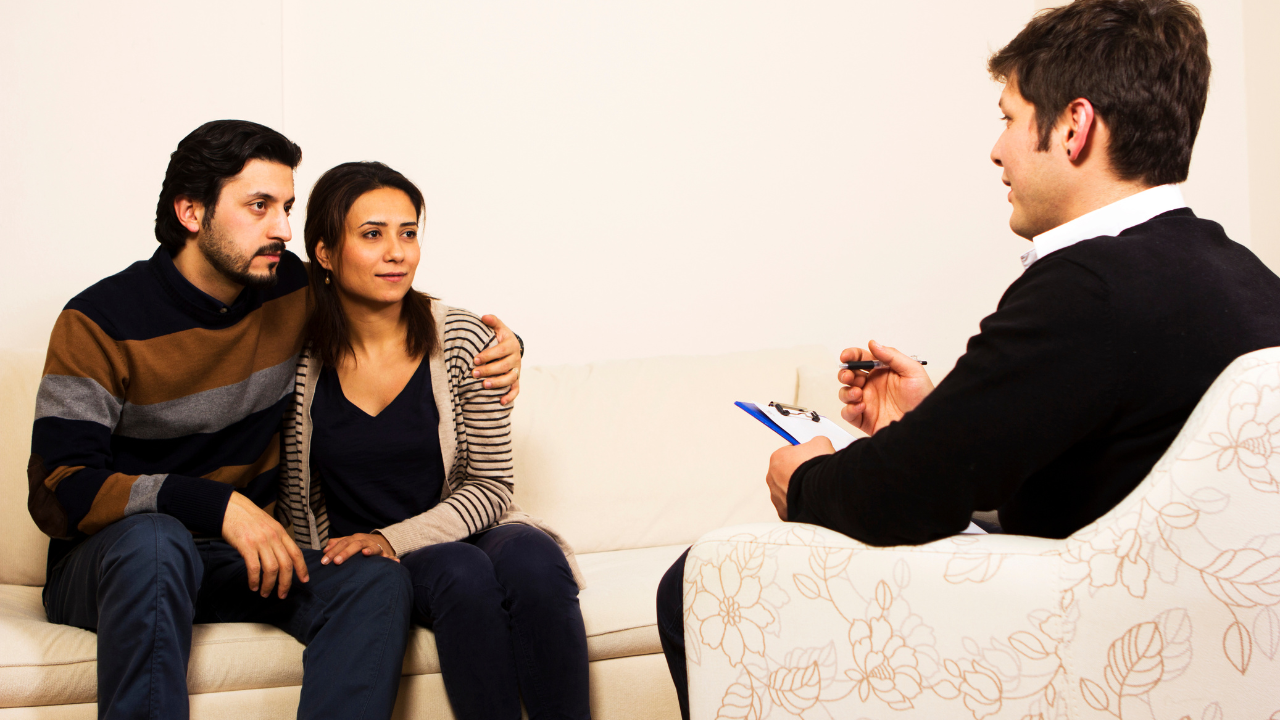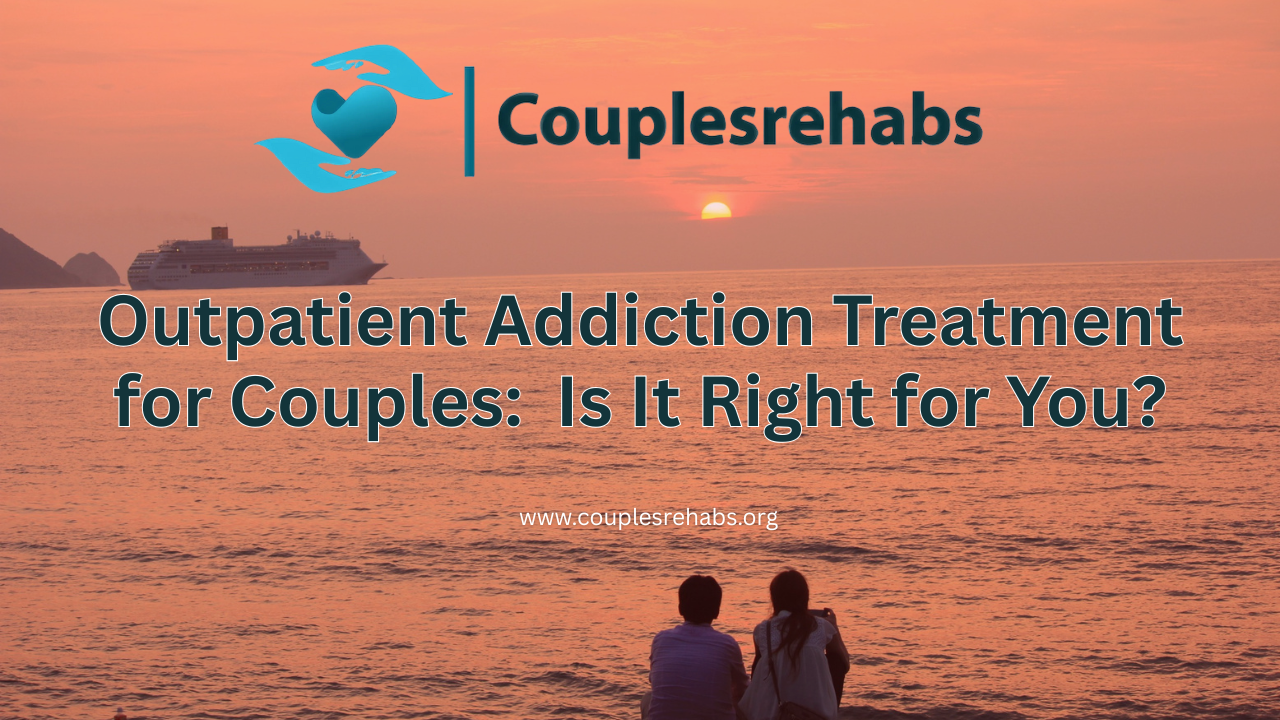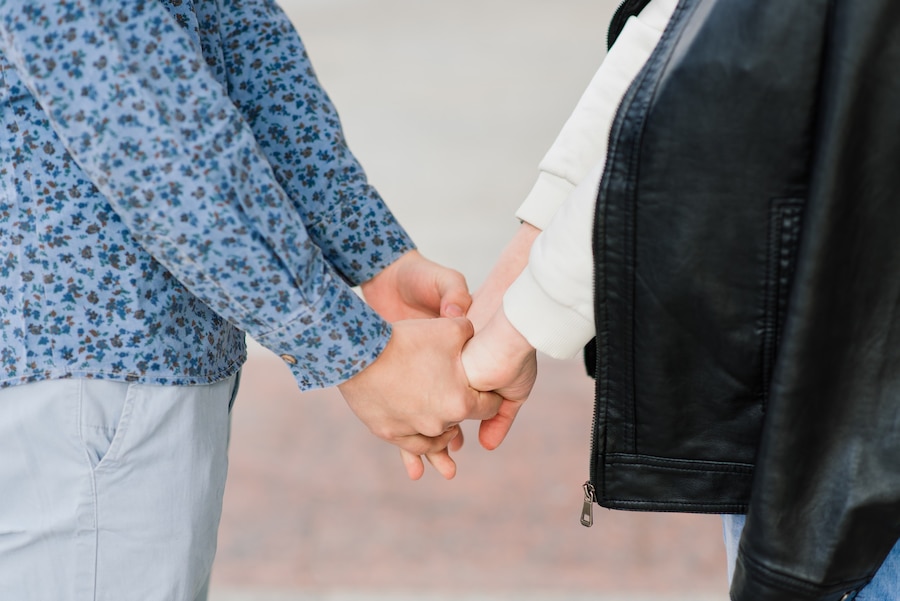Outpatient Addiction Treatment for Couples: Is It Right for You?
Sarah and Michael had been married for eight years when Michael’s prescription pain medication dependency spiraled into full-blown opioid addiction. What started as legitimate medical treatment after a workplace injury became a daily struggle that consumed their savings, eroded their trust, and left Sarah feeling helpless and alone. Like many couples facing addiction, they discovered that the disease doesn’t just affect the person using substances—it impacts the entire relationship dynamic, creating patterns of codependency, enabling behaviors, and emotional trauma that can persist long after the substance use stops.
If you’re part of a couple struggling with addiction, you’re not alone in feeling overwhelmed by the complexity of healing both individual addiction and relationship wounds simultaneously. Traditional addiction treatment often focuses on the individual, but outpatient addiction treatment for couples recognizes that relationships can be both a contributing factor to addiction and a powerful catalyst for recovery. At Couples Rehabs, we understand that when couples heal together, they create a stronger foundation for lasting sobriety and relationship satisfaction.
This comprehensive guide explores how specialized outpatient programs can help couples navigate recovery while maintaining their daily responsibilities and strengthening their bond through the healing process.
Understanding Addiction’s Impact on Relationships
Addiction doesn’t exist in a vacuum—it weaves itself into every aspect of a couple’s life, creating destructive patterns that can persist even after sobriety begins. Research from the Journal of Substance Abuse Treatment indicates that approximately 50% of individuals in addiction treatment have partners who also struggle with substance use disorders, while many others develop codependent behaviors as a survival mechanism.
When one or both partners struggle with addiction, several damaging dynamics typically emerge. Trust erodes as lies about substance use, hidden purchases, and broken promises accumulate over time. Communication breaks down as conversations become focused on addiction-related crises rather than genuine connection and intimacy. Financial strain mounts from treatment costs, lost productivity, and money spent on substances. Children in these families often experience emotional neglect, inconsistent parenting, and trauma that can affect their development for years.
Codependency frequently develops as the non-addicted partner attempts to control or manage their loved one’s addiction through enabling behaviors, emotional manipulation, or taking on excessive responsibility for household management and childcare. This creates an unhealthy dynamic where both partners lose their individual identities and the relationship becomes centered around addiction rather than mutual love and respect.
Evidence-based outpatient treatment for codependency in couples addresses these complex relationship patterns while simultaneously treating the underlying addiction. Rather than viewing the non-addicted partner as merely a support person, comprehensive couples treatment recognizes that both individuals need healing and skill development to create a healthy relationship foundation.
The impact extends beyond the couple themselves. Children living in homes affected by addiction experience higher rates of anxiety, depression, and behavioral problems. They may struggle academically, have difficulty forming healthy relationships, and carry trauma into their adult lives. When parents receive outpatient opiate addiction treatment for couples with children, family therapy components help address these generational impacts and teach healthy coping strategies for the entire family unit.
What Makes Outpatient Couples Addiction Treatment Unique?
Traditional addiction treatment approaches often separate partners during the most intensive phases of recovery, operating under the assumption that individuals need to focus solely on their personal healing before addressing relationship issues. While individual work remains important, this approach can inadvertently strengthen the disconnection that addiction has already created between partners.
Outpatient addiction treatment for couples takes a different approach by recognizing that relationships can serve as powerful motivators for recovery when both partners are committed to healing. Instead of viewing the relationship as a potential obstacle to sobriety, couples-focused treatment harnesses the strength of partnership to create accountability, emotional support, and shared goals for recovery.
This treatment model offers several distinct advantages over traditional approaches. Couples learn recovery skills together, ensuring that both partners understand addiction as a medical condition rather than a moral failing. They develop communication strategies specifically designed for recovery situations, such as how to discuss cravings, triggers, and setbacks without judgment or enabling behaviors. Most importantly, they create a shared vision for their future that extends beyond simply stopping substance use to building a fulfilling life together.
The outpatient setting provides flexibility that’s particularly valuable for couples managing family responsibilities, work obligations, and financial constraints. Unlike residential treatment that requires extended time away from home, affordable outpatient drug rehab for married couples allows partners to maintain their daily routines while receiving intensive support. This continuity helps couples practice their new skills in real-world situations immediately, rather than having to readjust to normal life after completing an isolated treatment program.
Financial accessibility represents another crucial advantage of outpatient couples treatment. Residential programs can cost tens of thousands of dollars and may not be covered by insurance, making them inaccessible for many families. Outpatient programs typically cost significantly less and are more likely to be covered by health insurance plans, making recovery achievable for couples across various economic circumstances.
Core Components of Effective Couples Treatment
Successful outpatient couples addiction treatment incorporates several evidence-based therapeutic approaches tailored to address both individual addiction and relationship dynamics. Behavioral interventions help couples identify and modify destructive patterns while developing healthy coping strategies for stress, conflict, and triggers. Communication skills training teaches partners how to express needs, set boundaries, and provide support without enabling addictive behaviors. Relapse prevention planning involves both partners in creating strategies for maintaining sobriety and responding effectively to potential setbacks. Family therapy integration addresses the impact of addiction on children and extended family members while strengthening the overall family system.
Types of Outpatient Programs Available for Couples
The landscape of outpatient addiction treatment offers various program structures designed to meet couples at different stages of recovery and with varying levels of need. Understanding these options helps couples select the most appropriate level of care for their specific circumstances.
Intensive Outpatient Programs (IOP) for Couples
Intensive outpatient programs represent the most structured form of outpatient care, typically requiring 9-12 hours of treatment per week spread across multiple days. An intensive outpatient program (IOP) for dual diagnosis couples provides comprehensive care for partners who may be dealing with both substance use disorders and co-occurring mental health conditions such as depression, anxiety, or trauma-related disorders.
IOP programs typically include individual therapy sessions for each partner, couples therapy sessions, group therapy with other couples in recovery, educational workshops on addiction and recovery, and family therapy when children are involved. The intensive nature of these programs makes them ideal for couples transitioning from residential treatment, those with severe addiction or multiple failed recovery attempts, or partners dealing with complex mental health issues alongside addiction.
The group therapy component of IOP programs provides particular value for couples, as it reduces isolation and shame while offering opportunities to learn from others facing similar challenges. Hearing other couples share their struggles and successes helps normalize the recovery process and provides practical strategies that have worked for others in similar situations.
Behavioral Couples Therapy Programs
Behavioral couples therapy represents one of the most researched and effective approaches to treating addiction within the context of intimate relationships. A behavioral couples therapy for alcohol addiction outpatient program focuses specifically on changing behaviors that contribute to substance use while strengthening positive interactions between partners.
This therapeutic approach operates on the principle that relationship satisfaction and addiction recovery are interconnected—as couples develop healthier communication patterns and increase positive interactions, the motivation for substance use typically decreases. The therapy includes specific techniques such as behavioral contracts where partners agree to specific recovery-supporting behaviors, communication skills training focused on expressing feelings without blame or criticism, shared recreational activities that don’t involve substance use, and relapse prevention planning that involves both partners.
Research consistently demonstrates that behavioral couples therapy produces better outcomes than individual treatment alone, with higher rates of sustained sobriety and improved relationship satisfaction. The approach is particularly effective for couples where both partners are motivated to participate in treatment and commit to changing their relationship patterns.
Specialized Program Options
Recognition that couples have diverse backgrounds, beliefs, and preferences has led to the development of specialized outpatient treatment options that address specific needs and circumstances.
Christian-based outpatient addiction treatment for married couples integrates faith-based principles and biblical teachings into the recovery process. These programs often include prayer, scripture study, and pastoral counseling alongside evidence-based addiction treatment methods. For couples whose faith plays a central role in their lives, incorporating spiritual elements into recovery can provide additional motivation and support while aligning treatment with their core values and belief systems.
The rise of technology has made online couples counseling for addiction recovery increasingly accessible and effective. Virtual treatment options eliminate geographic barriers, reduce scheduling conflicts, and provide privacy that some couples prefer during early recovery. Online programs typically include video therapy sessions, digital educational materials, virtual support groups, and mobile apps for tracking progress and accessing resources. While online treatment may not be appropriate for couples with severe addiction or safety concerns, it offers valuable flexibility for those balancing treatment with work and family responsibilities.
Geographic considerations play an important role in treatment accessibility. Couples therapy for substance abuse near San Diego CA provides specialized resources for local families, including culturally sensitive treatment options, connections to community resources, and understanding of regional insurance coverage and legal considerations. Local programs also offer the advantage of in-person connection and the ability to build lasting relationships with treatment providers and other couples in recovery.

The Role of Support Systems in Couples Recovery
Recovery thrives in community, and couples facing addiction need support networks that understand their unique challenges and can provide both practical assistance and emotional encouragement. While professional treatment provides the foundation for recovery, ongoing support systems often determine whether couples maintain their progress long-term.
Support groups for partners of addicts in outpatient treatment serve multiple crucial functions in the recovery process. These groups provide education about addiction as a disease, helping partners understand that addiction isn’t a choice or moral failing but a complex medical condition requiring professional treatment. They offer emotional support from others who truly understand the fear, anger, and confusion that addiction brings to relationships. Practical strategies shared in support groups help partners learn how to support recovery without enabling addictive behaviors.
Peer support specifically designed for couples in recovery creates opportunities for partners to learn from others who have successfully navigated similar challenges. These groups often focus on relationship skills, communication strategies, and rebuilding intimacy and trust after addiction has damaged the relationship foundation. Seeing other couples who have not only achieved sobriety but also strengthened their relationships provides hope and practical examples of what’s possible in recovery.
Family support extends beyond the couple to include children, parents, siblings, and close friends who play important roles in the recovery process. When families understand addiction and recovery principles, they can provide more effective support while avoiding behaviors that inadvertently enable continued substance use. Family education programs teach loved ones how to set healthy boundaries, communicate effectively about recovery, and take care of their own emotional needs while supporting their loved ones’ sobriety.
Community involvement through religious organizations, volunteer activities, and social clubs provides couples with substance-free social opportunities and a sense of purpose beyond their recovery. Building connections with others who share similar values and interests helps couples create a new identity that isn’t centered around addiction or recovery but includes these experiences as part of a fuller, more meaningful life.
Preventing Relapse: Long-term Success Strategies
Addiction recovery is not a destination but an ongoing journey that requires continuous attention, skill development, and commitment from both partners. Understanding that relapse rates for addiction mirror those of other chronic diseases like diabetes and hypertension helps couples approach setbacks with appropriate perspective while taking proactive steps to prevent them.
Short-term outpatient rehab for couples to prevent relapse focuses on identifying early warning signs and developing rapid response strategies when challenges arise. These programs teach couples how to recognize stress patterns, environmental triggers, and relationship conflicts that might increase relapse risk. More importantly, they help couples develop specific action plans for responding to these situations before they escalate into crisis.
Effective relapse prevention involves both individual and relationship components. Each partner learns to identify personal triggers such as specific emotions, situations, or physical sensations that historically preceded substance use. They develop coping strategies that don’t involve substances, such as exercise, meditation, creative activities, or reaching out to support network members. Couples work together to identify relationship triggers such as certain types of conflicts, financial stress, or family situations that create vulnerability for both partners.
Communication strategies specific to recovery situations help couples navigate challenges without damaging their relationship or increasing relapse risk. This includes learning how to discuss cravings openly without fear or judgment, how to ask for support when feeling vulnerable, how to address conflicts without escalating to harmful behaviors, and how to celebrate recovery milestones together in meaningful ways.
Long-term success often depends on couples’ ability to create new lifestyle patterns that support sobriety while building satisfaction and meaning in their relationship. This might involve developing new hobbies or interests that both partners enjoy, establishing regular relationship rituals such as weekly dates or daily check-ins, creating financial goals and plans that provide motivation and direction, and building social connections with other couples who prioritize healthy living.
Ongoing maintenance programs help couples continue developing their recovery and relationship skills long after completing intensive treatment. These might include monthly couples therapy sessions, participation in recovery support groups, annual relationship retreats or intensives, and regular assessment of recovery and relationship goals with adjustments as needed.
Getting Started: Your Path to Recovery Together
Taking the first step toward recovery as a couple requires courage, commitment, and often a leap of faith that healing is possible even when the relationship feels damaged beyond repair. The assessment process for couples typically begins with individual evaluations to understand each partner’s substance use history, mental health status, and treatment needs, followed by couples assessment to identify relationship strengths, challenges, and goals for treatment.
Professional assessment helps determine the most appropriate level of care, whether intensive outpatient treatment, standard outpatient therapy, or specialized programs designed for specific circumstances. This process also identifies any immediate safety concerns, evaluates the need for medical detoxification, and assesses each partner’s motivation and readiness for change.
Insurance coverage for couples addiction treatment varies significantly, but many health insurance plans provide coverage for outpatient addiction treatment, individual and couples therapy, and psychiatric services when needed. Understanding your specific coverage and advocating for necessary treatment helps ensure that financial barriers don’t prevent access to recovery resources. Many treatment centers offer sliding scale fees, payment plans, or assistance with insurance navigation to make treatment accessible regardless of financial circumstances.
The decision to enter treatment together represents a profound commitment to both individual healing and relationship growth. While the journey ahead may feel overwhelming, thousands of couples have successfully navigated addiction recovery and built stronger, more fulfilling relationships than they ever thought possible. With proper treatment, ongoing support, and mutual commitment, recovery can become the foundation for a partnership characterized by honesty, intimacy, and shared purpose.
Conclusion
Outpatient addiction treatment for couples offers hope and healing for partnerships that have been damaged by substance use disorders. By addressing both individual addiction and relationship dynamics simultaneously, couples can create lasting recovery while strengthening their bond and building a foundation for long-term happiness and sobriety.
The journey isn’t easy, but it’s entirely possible with the right support, treatment approach, and commitment from both partners. Whether you’re dealing with alcohol addiction, opioid dependence, or other substance use disorders, specialized couples treatment programs provide the tools, skills, and support necessary for successful recovery.
At Couples Rehabs, we understand that your relationship can be your greatest strength in recovery. Contact us today to learn more about our comprehensive outpatient addiction treatment programs designed specifically for couples ready to heal together and build a brighter future.
Frequently Asked Questions About Outpatient Addiction Treatment for Couples
How long does outpatient addiction treatment for couples typically last?
Most intensive outpatient programs last 8-12 weeks with 3-4 sessions per week. Standard outpatient therapy continues for 6-12 months, with sessions gradually decreasing as couples develop recovery skills.
Can we receive treatment if only one partner has an addiction?
Yes. Addiction affects the entire relationship, so both partners benefit from treatment. The non-addicted partner often develops codependent behaviors that require healing and new communication skills.
What if we both have different types of addictions?
Couples with different addictions can absolutely receive treatment together. Programs can address multiple substance use disorders simultaneously while focusing on shared recovery goals.
Is outpatient treatment as effective as residential treatment for couples?
Yes, outpatient treatment can be equally effective for motivated couples who don’t require medical detoxification. It allows you to practice recovery skills in your real-world environment.
How much does couples addiction treatment cost?
Individual therapy ranges from $100-300 per session, couples therapy $150-400 per session. Intensive outpatient programs cost $3,000-10,000. Many insurance plans provide coverage.
What happens if one of us relapses during treatment?
Relapse doesn’t mean treatment failed. Programs have protocols including increased sessions, safety planning, and additional support for both partners to learn from the experience.
Can we include our children in the treatment process?
Yes, many programs include family therapy components. Children benefit from age-appropriate education about addiction and learning healthy coping strategies for the whole family.
Do you offer treatment for same-sex couples?
Absolutely. LGBTQ+-affirming programs understand unique challenges same-sex couples face and provide culturally competent care for both addiction and relationship concerns.
What if we’re not married but have been together for a long time?
Marriage isn’t required. Treatment programs welcome committed couples regardless of marital status, recognizing that relationship commitment matters more than legal documents.
How do we know if we’re ready for couples treatment?
You’re ready when both partners acknowledge addiction’s impact on your relationship and commit to honest participation in healing. Assessment sessions can help determine if couples treatment fits your situation.






Recent Comments